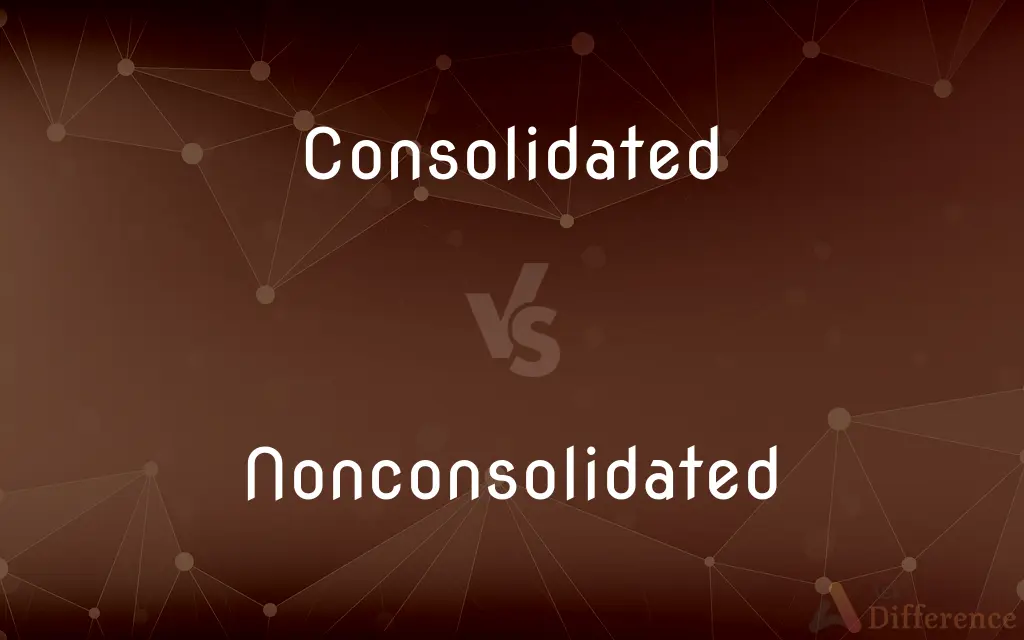Consolidated vs. Nonconsolidated — What's the Difference?
By Fiza Rafique & Maham Liaqat — Updated on April 15, 2024
Consolidated entities merge financials for reporting, showing overall performance; nonconsolidated entities report separately, emphasizing individual accountability.

Difference Between Consolidated and Nonconsolidated
Table of Contents
ADVERTISEMENT
Key Differences
Consolidated financial statements combine all assets, liabilities, and operating accounts of a parent company and its subsidiaries. This approach provides a comprehensive view of the financial health of the entire corporate group. On the other hand, nonconsolidated financial statements are prepared for each entity within a group separately, maintaining distinct financial records and highlighting individual performance without aggregation.
When dealing with consolidated entities, intercompany transactions are eliminated to prevent double counting, offering a clear picture of external activities. Whereas, in nonconsolidated entities, these transactions between entities in the same group are still reflected in each entity's books, which can lead to a less transparent view of each entity’s external financial engagements.
Consolidated reporting is often required by regulatory standards for large multinational corporations to provide a unified financial statement that reflects the total resources of the corporate structure. In contrast, nonconsolidated reporting is frequently used by smaller entities or subsidiaries that operate independently, where the parent company does not exert full control.
Investors typically favor consolidated statements to assess the overall prowess and risks of a corporation, as these documents reflect the total economic activities. On the other hand, nonconsolidated statements are crucial for stakeholders interested in the performance of specific segments or units within the larger entity.
In terms of compliance, consolidated accounting is more complex and rigorous, requiring detailed reconciliation of all accounts involved. Nonconsolidated accounting, while simpler, requires careful management to ensure transparency and accuracy in reporting the financial activities of separate entities.
ADVERTISEMENT
Comparison Chart
Financial Integration
Full integration of financial statements
No integration; separate financial statements
Intercompany Transactions
Transactions are eliminated in reporting
Transactions are recorded and reported
Regulatory Requirement
Often mandatory for large corporations
Optional or based on specific criteria
Stakeholder Focus
Provides a macro view for overall corporate health
Focuses on individual entity's performance
Complexity
Higher due to the need for detailed reconciliation
Lower, more straightforward accounting
Compare with Definitions
Consolidated
In finance, combining multiple entities' financials as if they are one.
The consolidated balance sheet includes assets from all subsidiaries.
Nonconsolidated
Not merged into a single entity or group.
The business units operated nonconsolidated, focusing on individual market strategies.
Consolidated
Formed or coordinated into a whole unit.
The companies were consolidated under a single management structure.
Nonconsolidated
In finance, reporting without combining financials with those of affiliated entities.
They issued nonconsolidated profit and loss statements quarterly.
Consolidated
To combine into a more solid, compact form.
The materials were consolidated into a smaller, denser package.
Nonconsolidated
Maintaining separation between components or units.
Each subsidiary produces nonconsolidated financial statements.
Consolidated
To make firm or secure.
She consolidated her resources before starting the project.
Nonconsolidated
Existing independently without reinforcement from other sources.
He decided to manage his investments on a nonconsolidated basis.
Consolidated
Having all components merged into a unified system.
The financial reports were consolidated for the entire corporation.
Nonconsolidated
Not made denser or more compact.
The shipment included several nonconsolidated packages.
Consolidated
To unite into one system or whole; combine
Consolidated five separate agencies into a single department.
Nonconsolidated
(financial) Including the financial data of only the parent company.
Consolidated
To make strong or secure; strengthen
She consolidated her power during her first year in office.
Consolidated
To make firm or coherent; form into a compact mass.
Consolidated
To become solidified or united.
Consolidated
To join in a merger or union
The two firms consolidated under a new name.
Consolidated
Having been consolidated.
Consolidated
(finance) Including financial data of the parent and all subsidiary companies.
Consolidated
Simple past tense and past participle of consolidate
Consolidated
Made solid, hard, or compact; united; joined; solidified.
The Aggregate Fund . . . consisted of a great variety of taxes and surpluses of taxes and duties which were [in 1715] consolidated.
A mass of partially consolidated mud.
Consolidated
Having a small surface in proportion to bulk, as in the cactus.
Consolidated plants are evidently adapted and designed for very dry regions; in such only they are found.
Consolidated
Joined together into a whole;
United Industries
The amalgamated colleges constituted a university
A consolidated school
Consolidated
Forming a solid mass
Common Curiosities
Who uses consolidated financial statements?
Consolidated financial statements are primarily used by shareholders, investors, financial analysts, and regulatory bodies to assess the overall health and performance of a corporate group.
What is the main focus of nonconsolidated financial statements?
The main focus of nonconsolidated financial statements is to report the financial status and performance of each individual entity within a group independently.
How do intercompany transactions affect consolidated and nonconsolidated statements?
In consolidated statements, intercompany transactions are eliminated to avoid double counting, while in nonconsolidated statements, these transactions remain within each entity’s books.
How do nonconsolidated financial statements differ from consolidated ones?
Nonconsolidated financial statements maintain the financial records of each subsidiary separately without combining them with those of the parent company or other subsidiaries.
Why do companies choose to consolidate financial statements?
Companies consolidate financial statements to provide a clear and comprehensive overview of the financial status of the entire corporate group, which is useful for investors, regulators, and other stakeholders.
What is a consolidated financial statement?
A consolidated financial statement is a comprehensive report that combines the financial data of a parent company and its subsidiaries into a single document, eliminating all intercompany transactions.
What are the benefits of nonconsolidated financial reporting?
Nonconsolidated financial reporting allows for detailed visibility into each entity’s performance, which can be important for strategic decision-making and meeting specific regulatory standards.
Are consolidated financial statements more complex to prepare than nonconsolidated ones?
Yes, consolidated financial statements are more complex due to the necessity of eliminating intercompany transactions and reconciling multiple financial accounts.
What role does transparency play in consolidated vs. nonconsolidated reporting?
Consolidated reporting aims to enhance transparency by providing a holistic view of a company's financial health, whereas nonconsolidated reporting focuses on the transparency of individual units.
Can a company have both consolidated and nonconsolidated financial statements?
Yes, a parent company can prepare both consolidated financial statements for the whole group and nonconsolidated statements for individual subsidiaries, depending on legal requirements and business needs.
How do stakeholders benefit from nonconsolidated reports?
Stakeholders benefit from nonconsolidated reports as they provide detailed insights into the operations and financial conditions of specific segments of a business, useful for direct investment and operational analysis.
Is it mandatory for all companies to produce consolidated financial statements?
Not all companies are required to produce consolidated financial statements; it depends on the company’s size, structure, and regulatory requirements.
What challenges arise in preparing consolidated financial statements?
Challenges include aligning accounting policies across subsidiaries, currency conversion for international entities, and detailed tracking and elimination of intercompany transactions.
Can nonconsolidated entities be part of a larger corporation?
Yes, nonconsolidated entities can be part of a larger corporation but are reported independently, often because the parent company does not fully control or own the subsidiary.
What does the elimination of intercompany transactions entail in consolidated reporting?
Elimination involves adjusting sales, expenses, and profits recorded in transactions between companies within the same group to prevent overstatement of revenues and assets in consolidated financial statements.
Share Your Discovery

Previous Comparison
Heading vs. Headline
Next Comparison
Edibleness vs. EdibilityAuthor Spotlight
Written by
Fiza RafiqueFiza Rafique is a skilled content writer at AskDifference.com, where she meticulously refines and enhances written pieces. Drawing from her vast editorial expertise, Fiza ensures clarity, accuracy, and precision in every article. Passionate about language, she continually seeks to elevate the quality of content for readers worldwide.
Co-written by
Maham Liaqat















































